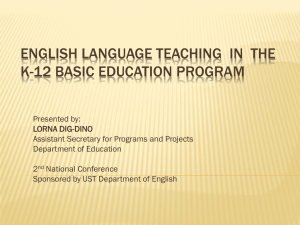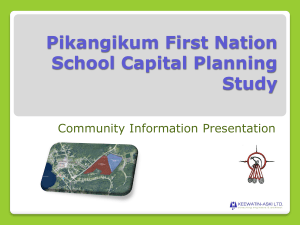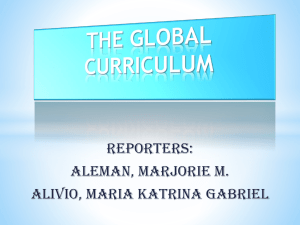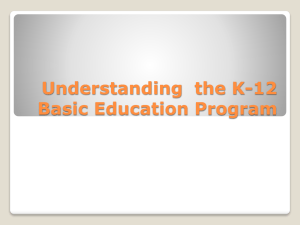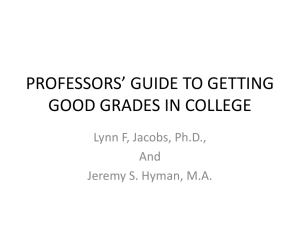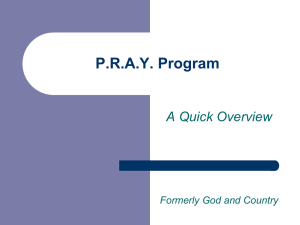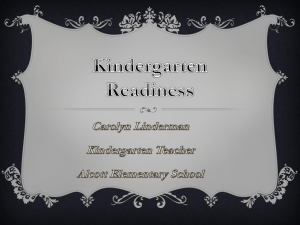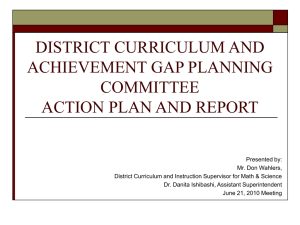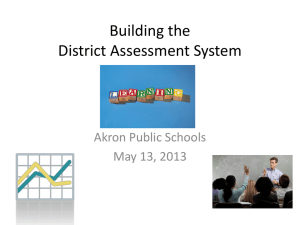Primer On The Enhanced K TO 12 BASIC EDUCATION PROGRAM
advertisement
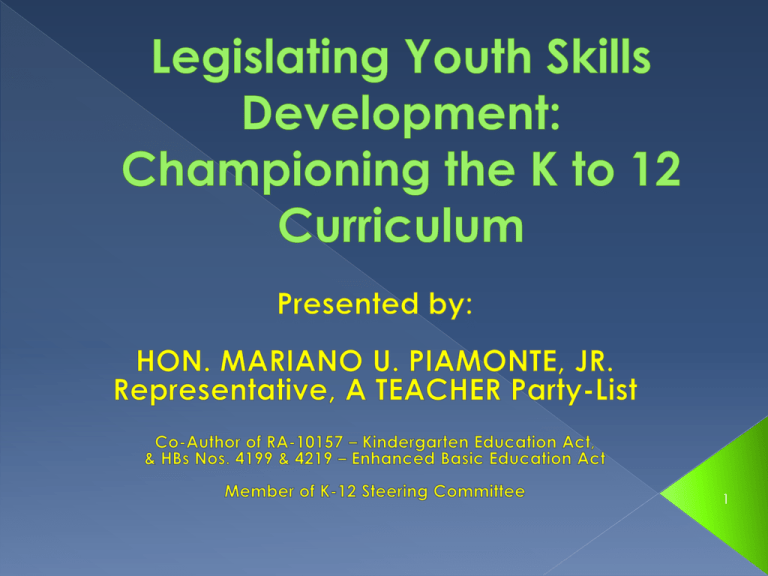
1 One of the thrusts of President Benigno Simeon C. Aquino III in his administration is the improvement of the quality of Philippine education, particularly basic education, as reflected in his policy statement and ten-point Agenda, as follows : 2 POLICY STATEMENT “We need to add two more years to our basic education. Those who can afford pay up to fourteen years of schooling before university. Thus, their children are getting into the best universities and the best jobs after graduation. I want at least 12 years for our public school children to give them an even chance at succeeding.” -Pres. Benigno Simeon C. Aquino, III 3 12-year Basic Education Cycle I will expand the basic education cycle, from a 10year cycle to a globally-comparable 12 years, for our public school children. At present, those who can afford basic education get into the best universities and the best jobs after graduation. Universal pre-schooling for all All public school children will have preschool as their introduction to formal schooling by 2016, and we will make this available to all children regardless of income. 4 Madaris education as a sub-system within the education system . I want a full basic education for all Muslim Filipino children. This is to give proper respect to their culture while providing a sound curriculum in English, Filipino, science, and math. Madaris education, with subjects in Arabic language and Islamic values education, can be integrated in our public school curriculum as additional subjects. Technical vocational education as an alternative stream in senior high school. I will reintroduce technical-vocational education in our public high schools to better link schooling to local industry needs and employment. We need to provide an educational alternative to better prepare the students for the world of work. 5 “Every child a reader” by Grade 1. By the end of the next administration, every child must be a reader by Grade 1. Science and Math proficiency I will rebuild the science and math infrastructure in schools so that we can produce more scientists, engineers, technicians, technologists and teachers in our universities so that this country can be more globally competitive in industry and manufacturing. 6 Assistance to private schools as essential partners in basic education. I will expand government assistance to private education. Medium of instruction rationalized We should become a trilingual nation: Learn English well and connect to the world. Learn Filipino well and connect to our country. Retain your dialect and connect with your heritage. 7 Quality textbooks Textbooks should have quality, better quality, and more quality. Poor quality textbooks have no place in our schools. Covenant with the local governments to build more schools I will build more schools in areas where there are no public or private schools in partnership with local governments, as well as address our persistent classroom and teacher shortages. 8 Need for Enabling Laws Some of the items in the 10-point Agenda need enabling legislations to implement and provide them with necessary appropriations. Others simply need executive or administrative action by the appropriate government agencies. Developmental laws rather than regulatory laws should be preferred to promote rather than restrict the growth and development of educational institutions and their programs. 9 RA No. 10157 – An Act Institutionalizing the Kindergarten Education into the Basic Education System and Appropriating Funds Therefor. Also known as the “Kindergarten Education Act.” (Introduced by Reps. Thelma Z. Almario, Salvador H. Escudero III, Juan Edgardo M. Angara, Mariano U. Piamonte Jr., et.al.) After being passed by both Houses of Congress, the Act was signed into law by the President on January 20, 2012. 10 The Mandates of the Kindergarten Education Act are as follows: 1. To institutionalize kindergarten education as part of basic education and make it mandatory and compulsory for entrance to Grade 1. 2. To use the mother tongue of the learner as the primary medium of instruction for teaching and learning. 11 3. To provide necessary appropriations for the implementation of the Act 4. To direct the DepEd to serve as the implementing agency, and to issue the implementing rules and regulations, in consultation with the DBM, within 90 days after the effectivity of the Act. 12 HR No.12, Resolution Directing the Committee on Basic Education and Culture to Conduct an Inquiry, in Aid of Legislation, on the Propriety of Adopting a Twelve(12)- Year Education Cycle in Elementary and High School (Basic Education). Introduced by Rep. Marcelino R. Teodoro HB No. 2182, An Act Prescribing a Twelve (12)-Year Basic Education Curriculum for all Public and Private School Children Nationwide, Providing Guidelines and Mechanism for Its Implementation, Appropriating Funds Therefor and For other Purposes. Introduced by Rep. Eulogio R. Magsaysay 13 HB No. 4199, An Act Enhancing the Curriculum and Increasing the Number of Years for Basic Education, Appropriating Funds Therefor and for other Purposes. (Also known as “Enhanced Basic Education Act of 2011”). Introduced by Reps. Salvador H. Escudero III, Juan Edgardo M. Angara, Mariano U. Piamonte, Jr., Maria Isabelle G. Climaco, Bernadette R. Herrera-Dy and Fatima Aliah Q. Dimaporo 14 HB No. 4219, An Act Enhancing the Curriculum and Increasing the Number of Years for Basic Education, Appropriating Funds Therefor and for other Purposes (also known as “Enhanced Basic Education Act of 2011”). Introduced by Reps. Feliciano R. Belmonte Jr., Salvador Escudero III, Juan Edgardo M. Angara, Mariano U.Piamonte,Jr.,Julieta R. Cortuna, Joseph Emilio A. Abaya, Thelma Z. Almario, Bernadette Herrera-Dy, Maria Isabelle G. Climaco 15 STATUS OF THE HOUSE BILLS ON K-12 1. The House Bills are still pending in the Lower House of Congress and are being subjected to regional public hearings conducted by the Joint Committees on Basic Education and Higher and Technical Education. Public hearings have been conducted in all regions in Mindanao and Visayas, including Region 4B. Public hearings are yet to be conducted in NCR and Luzon regions. 2. After the hearings, the bills will be consolidated into a single bill to be known as Enhanced Basic Education Act. 3. The President has already signified to consider the Enhanced Basic Education Act as a priority bill. 16 MANDATES OF THE ENHANCED BASIC EDUCATION ACT 1. Basic Education shall include kindergarten and twelve (12) years of elementary and secondary education. 2. The DepEd shall formulate the curriculum and determine the actual number of years for the elementary and secondary education programs, in coordination with CHED, TESDA, DTI, DOLE, DOST and NEDA, and in consultation with all stakeholders, including but not limited to public and private educational institutions, schools associations, teachers organizations, PTAs and Chambers of Commerce. 17 3. The DepEd, in coordination with CHED and TESDA, shall issue rules and regulations that may be necessary and consistent with the declared principles and policies of the State. 4. The amount necessary to carry out the implementation of this Act shall be charged to the appropriations for the Department of Education under the current General Appropriations Act. Thereafter, such amounts as may be necessary for its continued implementation shall be included in the annual General Appropriations Act. 18 Enhancing the quality of basic education is urgent & critical. The poor quality of basic education is reflected in the low achievement scores of Filipino students in both national & international tests. One reason is that students do not get adequate instructional time or time on task. 19 The congested curriculum partly explains the present state of education. The current basic education is designed to teach a 12year curriculum, yet it is delivered in just 10 years. The Philippines is the only country in Asia and among the three remaining countries in the world with a 10-year basic education cycle. The two other countries are Djibouti and Angola in Africa. 20 Comparative Data on the Pre-University Education in Asia Country Basic Education Cycle Brunei 12 Cambodia 12 Indonesia 12 Lao PDR 12 Malaysia 12 Myanmar 11 Philippines 10 Singapore 12-14 Thailand 12 Timor-Leste 12 Vietnam 12 Mongolia recently added grades to make basic education 12 years 21 At present, our high school graduates are not adequately prepared for either the world of work, entrepreneurship or higher education. They are not emotionally developed and competent to live a meaningful life. While there is misperception that basic education is merely a preparatory phase for higher education, high school graduates still usually have to undergo remedial and high school level classes in colleges and universities. 22 Our graduates are not recognized as professionals abroad. The Washington Accord prescribes 12 years of basic education as an entry to recognition of engineering professionals. The Bologna Accord requires 12 years of education for university admission and practice of profession in European countries. Hence, the need to adopt a K-12 program that provides quality education and is internationally recognized and comparable. 23 The K to 12 Program is not new. As early as 1925, studies have observed the inadequacy of the basic education curriculum. Numerous recommendations of either adding or restoring 7th grade or adding an extra year to basic education have been put forward, from the Monroe Survey (1925) to the Presidential Task Force on Education (2008). President Aquino is the only president who has taken the political will to implement the K-12 Program in our country 24 K-12 Model After numerous consultations and reviews, DepEd is adopting the K-6-42 model which involves: Kindergarten, Six (6) years of Elementary Education, (Grades 1-6) Four (4) years of Junior High School (Grades 7 to 10) and Two (2) years of Senior High School (Grades 11-12). Senior High School Grades 11-12 (16-17 years old) Junior High School Grades 7-10 (12-15 years old) Elementary School Grades 1-6 (6-11 years old) Kindergaten (5 years old) K-12 CURRICULUM MODEL Grades 11-12 (New HS Years 5-6) Grades 9-10 • Science, Math, English, Contemporary issues and Specialization TechnicalVocational Specialization (New HS Years 3-4) • Core Learning Areas plus TLE of the student’s choice Grades 7-8 • Core Learning Areas and TLE (New HS Years 1-2) Grades 1-6 Kindergarten Academic Specialization • Core Learning Areas plus Mother Tongue until Grade 3; Science starting Grade 3; EPP starting Grade 4 Sports and Arts Specialization Offers tracks that lead to Specialization in Academics, Tech-Voc, And Sports & Arts • Learning Domains 27 PHASES OF IMPLEMENTATION OF K-12 Universal kindergarten will be offered starting SY 2011-2012. The enhanced curriculum will be offered to incoming Grade 1 as well as to incoming Junior High School students starting SY 2012-2013, The target of DepEd is to put in place the necessary infrastructure and other necessary arrangements needed to provide Senior High School (SHS) education by 2016-2017. Kindergarten and 12 years of quality basic education is a right of every Filipino, therefore these should be provided by the government for free in public schools and subsidized in participating private schools under GASTPE Students who complete the 12-year Program will receive the following: elementary diploma (after 6 years), a junior high school diploma (after 4 years), a senior high school diploma (after 2 years). A full 12 years of basic education will eventually be required for entry into tertiary level education (entering college freshmen by 2018-2019 or seven years from now). SOME FEATURES OF K-12 Kindergarten curriculum will have a standardized Elementary and Junior high school curricula will be basically similar to the current Elementary and High school curricula with some modifications in some subject titles, contents, objectives, desired minimum learning competencies, methodologies, time allotment, etc. Electives may also be provided to allow schools to offer additional subjects relevant to the needs of students. Senior High School Curriculum will include basic subjects brought down from 1st and 2nd year general education curriculum in college. These subjects are English 1 & 2, Filipino 1 & 2, Science 1 & 2, Math 1 & 2 and others. Thus, college courses will be reduced by one (1) year Senior High School Curriculum will also include specializations in academics, technicalvocational, and sports & arts. Students will have to choose specializations based on their NCAE results. NCAE will be administered much earlier before Grades 11 and 12 to allow sufficient time for career counseling of students. 31 Specialized technical-vocational courses in Senior High School will enable students to prepare for work, either as employees or entrepreneurs, even before entering college. Specialized Technical-vocational courses in Senior High School will be designed according to TESDA specifications. Upon completion of tech-voc courses in Grades 11 & 12, certificates of competencies will be issued to the students after evaluation. 32 Since not all Senior High Schools are capable of offering several tech-voc courses, consortia and cross enrollment with other schools maybe arranged. Allowing students to take tech-voc courses in TESDA training centers may also be considered. Tech-voc teachers will be trained and certified by TESDA, and will undergo seminars on pedagogy. Exemption of tech-voc teachers from the LET requirement is being considered in view of the expected shortage of such teachers in Senior High School. Through the Enhanced K-12 Basic Education Program, it is envisioned that our graduates will: Possess sufficient mastery of basic competencies (literacy, numeracy, problem solving, etc.) Be emotionally developed and competent to live a meaningful life. Be socially aware, pro-active and involved in public and civic affairs. Be adequately prepared for the world of work or entrepreneurship or higher education. Be legally employable. Be globally competitive. K-12 GOALS To give every student an opportunity to receive quality education based on an enhanced and decongested curriculum that is internationally recognized and comparable. To change public perception that high school education is just a preparation for college. It is also a preparation for the world of work. To Individuals and Families, an enhanced curriculum : will decongest academic workload, give students more time to master competencies and time for extracurricular activities, thus, allow for a more holistic development. Graduates will possess competencies and skills relevant to job market Graduates will be better prepared for higher education. Graduates will be able to earn higher wages and/or better prepared to start their own business. Studies in the Philippines have shown that the additional year of schooling increases earning by 7.5%. Graduates could now be recognized abroad To Society and Economy K-12 will contribute to economic growth. Several studies have shown that the improvements in the quality of education will increase GDP growth by as much as 2%. K-12 will facilitate mutual recognition of Filipino Graduates and professionals in other countries. A better educated society provides a sound foundation for long term socio economic development. Enhancement of the basic education curriculum is the central focus of K-12. Enhancement is both quantitative and qualitative. Quantitative refers to additional years in Basic Education and additional infrastructures. Qualitative refers to improved quality of instruction, facilities, textbooks, instructional materials, equipment and other inputs 39 The enhanced curriculum will offer areas of specialization or electives such as science and technology, music and arts, agriculture and fisheries, sports, business and entrepreneurship, etc., and subjects for advanced placement Entrepreneurship will be integrated in Technical and Vocational courses. 40 As part of the bigger basic education reform, the enhanced K-12 education is undertaken hand in hand with the vigorous efforts to ensure adequacy of inputs. Change is two-fold: curriculum enhancement and transition management. An open and consultative process has been adopted in the development and implementation of K to 12. K-12 is work in progress, hence, its gradual year to year implementation. As a massive program, it will undergo birthing pains and growth problems. The openness, commitment, involvement and cooperation of stakeholders will help ensure the success of the program. Thank you! HB 4078, Creating the Bureau of Technology Education Under the Dept of Education HB 3430, Establishing/Insitutionalizing the Open High School System in the Phils. HB 3637, Institutionalizing the Bureau of Alternative Learning System (BALS) HB 66/HB 93, Strengthening & Enhancing the Use of English as the Medium of Instruction Act HB 162, The Multi-lingual Education & Literacy Act of 2010 HB 1753, Creating a National Career Assessment Examination 43 to Institutionalize a Career Direction Program...
